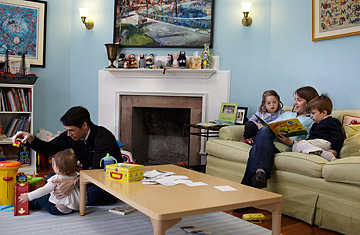
The new face of the Down-syndrome family. Becker reads to her daughter Penny, who has Down syndrome, and her son. Becker's book is about raising a child with the condition.
(3 of 5)
Other parents of children with Down syndrome tell similar stories. Becker's daughter Penny knows all her letters and is learning to read in a mainstream kindergarten class. She has green eyes behind pink glasses and loves pizza and playing freeze dance. "Can she live a full life without ever solving a quadratic equation? Without reading Dostoyevsky?" Becker asks. "I'm pretty sure she can. Can I live a full life without learning to cherish and welcome those in this world who are different from me? I'm pretty sure I can't."
If you believe the numbers, an overwhelming majority of Down-syndrome families feel this way. Brian Skotko, a doctor in the Down-syndrome program at Children's Hospital Boston who also chairs the clinical advisory board for the National Down Syndrome Society, recently co-published three surveys--one of people with Down syndrome, one of their parents and one of their siblings--in the American Journal of Medical Genetics. Of the more than 2,000 parents who responded, 99% said they loved their child with Down syndrome. Just 4% said they regretted having their child. Among siblings age 12 and older, only 4% said they'd trade their brother or sister with Down syndrome for another; 88% said they felt they were better people because of their sibling. The third study analyzed responses from 284 people with Down syndrome: 99% said they were happy with their lives.
The shortcomings of self-reported studies like these are obvious, and they're the same ones McLaughlin suspected when she met the parents of Anna and Amanda: when the die is cast and your life's arc is set, you're not likely to admit that you're miserable, especially to a scientist with a clipboard. Still, Skotko's findings are so overwhelmingly positive that even if 40% of the respondents were flat-out lying, the majority are still happy.
But the trend lines don't reflect that positive data. Even before the new screening test came along, Down-syndrome births had fallen over the course of 20 years: by 11% from 1989 to 2006. And this was happening in a period when the growing population of older mothers should have pushed the rates up 42%, according to a 2011 article in the journal Prenatal Diagnosis. In absolute terms, that translates to 65,492 Down-syndrome births when 122,519 might have been expected.
If Marcy Graham's inbox is any indication, that trajectory will continue. Graham is a spokeswoman for Sequenom, the company that developed one of the new tests, and she is flooded with inquiries from worried women who may have been reluctant to risk a miscarriage with more-invasive techniques. "I have been getting e-mails for months from people all over the world," she says. "There is so much anxiety around the thought of having a child anyway, and there's something about having this needle put in their stomach that's terrifying."
The Moral Muddle
